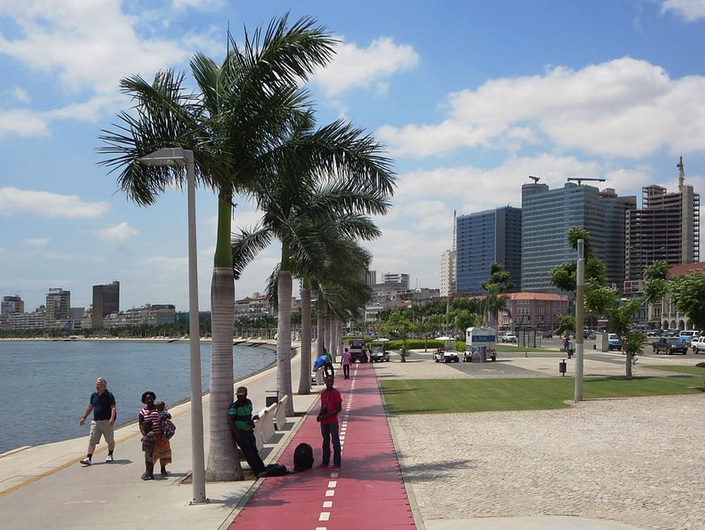OPEC Nation Commits to Renewable Energy, But Investors Are Wary

Angola, one of Africa’s oil-producing OPEC countries, has recently announced an ambitious plan to add 800 MW of renewable energy capacity by 2025. In contrast to its carbon-intensive petroleum exports, the country’s energy mix is fairly clean, with over 70 percent of electricity production coming from hydropower.

The government plans to maintain a clean energy mix – 66 percent from hydropower and an additional 8 percent from renewable energy – while doubling access to electricity within the next decade. This goal is especially important for the nation's off-grid rural areas, which would benefit immensely from distributed generation.
In an effort to advance discussions on renewable-energy investment, participants from Angolan and foreign governments, the private sector, and development NGOs met in Luanda, Angola on July 12 at the Angola Infrastructure and Renewable Energy Investment Conference hosted by Euroconvention Global.
While Angola has taken preliminary steps to prime the country for renewable energy investors by unbundling utilities, mapping renewable energy sites, and conducting feasibility studies, the sector is largely untested. The nation’s foreign exchange crisis, a local partnership mandate, and an opaque regulatory framework present barriers to investment.
Foreign Exchange Crisis
Foreign companies are very concerned with Angola’s foreign exchange crisis and are reporting issues repatriating dividends. Delays in foreign exchange subject investments to fluctuations in the devaluing Angolan Kwanza.
Angola’s petroleum industry accounts for 75 percent of government revenues and 50 percent of its GDP. The recent decline in oil prices has stymied government revenue and foreign commercial activity, leading to a shortage of foreign exchange.
At the conference, Tania Cascais and Rodrigo Rendiero Costeira, a partner and a managing associate at Miranda & Associados, presented responses to their clients’ frequently asked questions about renewable-energy investment in Angola.
Regarding the currency of payments, Cascais stressed payments must be made in Angolan Kwanzas. She noted that while profits and dividends can lawfully be repatriated, all foreign exchange contracts must be signed by the Angola Ministry of Energy and Water and approved by Banco Nacional de Angola.
Local Partnership Law
Another barrier to investment is Angola’s local partnership requirement. Selecting a local partner requires thorough due diligence to comply with anti-corruption acts. There are few candidate firms with sufficient technical capacity.
In August 2015, Angola passed the New Private Investment Law, which mandates a 35 percent local share in capital and effective participation in corporate management for the energy sector.
Cascais said investors frequently ask her firm, “Do I need a local partner for renewable energy?” The answer is yes. She added the local partner agreement is subject to approval by Angola Ministry of Energy and Water.
Complicated Regulatory Framework
"The complicated regulatory framework does not encourage investors," said Banji Oyelaran-Oyeyinka, acting director of the Regional Office for Africa of UN-Habitat.
“There is no legal framework specific to renewable energy [in Angola] and there are a few grey areas,” Cascais said.
Investors are required to bring money into the country, but there is no minimum threshold of investment, Cascais and Costeira said. Hiring Angolan employees is required; only 30 percent of the workforce can be foreign.
Investors also ask about tax benefits, Cascais and Costeira said. In order to receive tax benefits from an electricity project, the project has to have a value greater than $1 million USD.
Financial Exposure Mitigation
On the bright side, some of the risk can be mitigated. Investors may consider negotiating for a higher tariff price, a sovereign guarantee, or an escrow account.
A higher tariff price, which is paid by the utility to the power producer, provides a higher return on investment. This justifies some elements of risk. The price point for renewable power-purchase agreements in Angola is yet to be determined.
The price of solar power in Angola is likely to be elevated by the newness of the market. In contrast, the much more developed South African solar market sells power for a lower price of around $0.10/kWh in 2013, according to the International Finance Corporation.
In a sovereign guarantee, the government becomes the underwriter for payment to the power producer. The guarantee addresses risks related to the creditworthiness of the utility and its access to foreign exchange.
An escrow account functions as a line of credit for the utility and ensures revenues for the power producer. Generally, a third party establishes the escrow account, with funds covering the amount of several payments.
If the utility is unable to make a timely payment to the power producer, the power producer receives the payment from the escrow account. In an agreed-upon time frame, the utility is obliged to repay the funds to the escrow account.
Join our LinkedIn group to discuss this article. You may also email the author directly using our contact form.